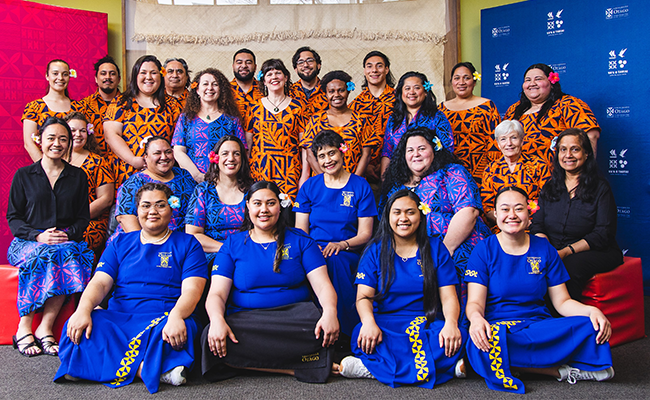
Va'a o Tautai has gone from strength to strength while grappling with the uncertainties of the COVID-19 pandemic, and at a reflective symposium hosted by the HEDC recently they shared how.
The COVID-19's Impact on Teaching and Learning at the University of Otago: Lessons Learnt Symposium was a platform for University of Otago staff to reflect on the challenges, victories and lessons from the years weathering the pandemic.
It was also an opportunity to celebrate the resilience and innovation of the University over a period of uncertainty.
For Va'a o Tautai – Centre for Pacific Health, this was a way to reflect, to heal and to celebrate after two years of working to keep students and communities safe, to maintain staff morale and to persevere with the ongoing kaupapa of the centre.
The Va'a o Tautai is made up of four operational branches, Strategic Direction & Leadership, Pacific Health Research, Pacific Health Teaching and Student Support.
The team gave four presentations discussing the highs and lows of the pandemic, the storms they have weathered and how their va'a [waka/boat] managed to sail through.
Deputy Director of Va'a o Tautai, Associate Professor Rose Richards, says she found the metaphor of the va'a in the Centre's name to be particularly helpful in her approach to leadership during the pandemic.
“I love stability. I'm always trying to push things towards stability, but at the same time I'm recognising that we are not here in our va'a as tourists, we're here as adventurers. In our drive for safety, it's important that we don't lose that courage,” she says.
“We are here with an enormous amount of privilege to change the world for our communities; that is our duty and we need to take that forward as we take our va'a forward.”
She says that while it was a busy and turbulent time, it was also a time of growth for the centre.
“Together we needed to figure out how to be responsive, how to be respectful, and how to stay true to our Pacific values in this new environment.”
Associate Professor Richards says maintaining team unity, finding stability within uncertainty, and keeping true to the Centre's core values were imperative to the resilience of the Va'a o Tautai over the past two years.
“We had to focus on what we could control.”
In her presentation, she talked about the early days of the pandemic, where Va'a o Tautai placed an emphasis on regular staff check-ins and clear outgoing communications with staff, students and stakeholders.
"We are all faced with a series of great opportunities brilliantly disguised as impossible situations."- Charles R. Swindoll
POPO Foundation Programme Co-ordinator Kala Fagasoaia spoke next. Her presentation, entitled 'The Grind Never Stops', discussed the creative ways her team continued to provide a wrap-around service for students across the alert levels.
Mrs Fagasoaia says her team was working around the clock ensuring that students had access to devices, to Uber Eats meals while isolating, and to wellbeing packs.
One of the services impacted by social distancing were the POPO and POPO PLUS programmes. These are mentoring programmes offered to students studying in the Division of Health Sciences Professional courses, allied health courses, and the Otago School of Medical Sciences as well as the Health Sciences First Year programme.
Mrs Fagasoaia says that COVID-19 restrictions posed a challenge to the degree to which students could connect with their mentors.
As a solution, their team looked to influencer culture and found “Instagram takeovers”, where POPO mentors would share aspects of their day with students online, to be an effective way for students to hear from and relate to their mentors.
The Pacific Health Teaching team at the Va'a o Tautai presentation talked about continuing to develop and deliver a culturally-informed teaching curriculum throughout the pandemic, and emphasised the importance of patience, understanding and maintaining relationships.
Their team shared the ways they kept the Pasifika communities connected and involved in their processes, particularly with community elders who Professional Practice Fellow Talai Mapusua Nabalagi says are “the holders of traditional knowledge and practices”.
Mrs Nabalagi says that their approach to mitigating challenges was guided by the Pacific values of family, spirituality, community, respect and reciprocity.
Finally, the Pacific Health Research arm of Va'a o Tautai spoke about their handling of Pacific research during the pandemic.
Research Fellow Dr Vanda Symon says the focus of her team was to improve people's sense of being supported which included keeping staff and participants safe with regular RAT testing and ensuring their needs were cared for.
Beyond support, their team had to think about the socioeconomic effects of COVID-19 and how that would impact their findings, which led to their citing of
COVID-19 as a stress factor in their research.
They also needed to adopt new ways of engaging with communities and collating data remotely.
“We had to learn the tech. Many of us upskilled during this time,” Ms Symon says.
In closing remarks, Professor Faumuina Dr Fa'afetai Sopoaga, Director of Va'a o Tautai – Centre for Pacific Health laid out the challenge to all with a quote from Charles R. Swindoll: “We are all faced with a series of great opportunities brilliantly disguised as impossible situations.”.
It is in how we take hold of these opportunities and our Pacific values that we see our staff, students, and communities' flourish, Professor Sopoaga says.
For more information, please contact Dr Rose Richards at vot@otago.ac.nz